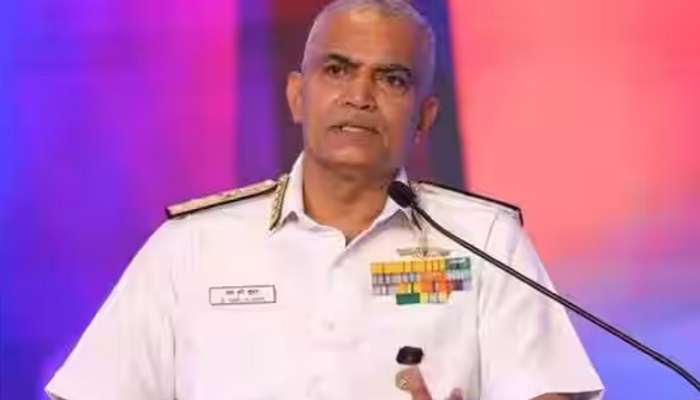
Contemporary maritime challenges are best addressed by several countries working together on the basis of “issue-based convergences” and India’s work with regional groupings is helping build trust and interoperability, Indian Navy Chief Admiral R Hari Kumar said on Saturday.
Technological innovations such as space-based surveillance, artificial intelligence (AI) and elint or electronic intelligence are helping maritime commanders have better maritime domain awareness but the Ukraine war has shown the rapidity with which counter-measures are developed for all new technologies, Admiral Kumar said at a panel discussion during the Raisina Dialogue.
The Indian Navy Chief, for the discussions, was joined by Admiral John Aquilino, commander of the US Indo-Pacific Command, the UK Chief of Naval Staff Admiral Sir Ben Key, Chief of Staff of Japan’s defence ministry Gen Koji Yamazaki and the Royal Canadian Navy commander Vice Admiral Angus Topshee. The military commanders discussed a range of issues– from the impact of green fuels on the interoperability of navies to the human element using the latest technologies.
Asked about the Indian perspective on working with partners for deterrence and the potential conduct of warfare, Kumar said challenges in the maritime domain, which are both non-traditional and transnational, cannot be addressed by any individual nation.
“Therefore, there is a need for cooperation…that is something we in the maritime domain always look forward to – to find how to cooperate, how to work together. While doing this, I would say today we are looking at issue-based convergences. We may not agree on certain things, but we will agree on many other issues,” Kumar said.
He cited the example of India working with others on climate change through bodies such as the International Solar Alliance (ISA), and cooperation in the security realm through groupings such as the Indian Ocean Naval Symposium (IONS), which has 25 partner countries, Colombo Security Conclave and Goa Maritime Conclave. “We are looking at regional solutions to regional problems,” he said.
“When we work in smaller groups, it serves a lot of purposes. For example, it generates a lot of trust amongst the partner countries. Then, you work towards building capacity, it results in increased interoperability, better domain awareness, regular engagements, and all this is what finally leads to maritime security,” Kumar added.
India’s policy for working with others in the region is based on the principles of respect, dialogue, peace and prosperity, and the vision of SAGAR or security and growth for all in the region.
Talking about the impact of new commercial and military capabilities on the maritime domain and the risk of oceans becoming “too transparent,” the Admiral said developments in space-based surveillance, improved maritime domain awareness, AI, electro-optics, and elint help provide commanders with a complete picture of their surroundings.
The space needed to be covered at sea is substantial and requires a large number of space-based assets, and special capabilities are required to track moving vessels in real-time, Kumar said.
“Whenever technology is developed, you’ll find there is a counter to it. Especially, we see in the Ukraine war that when technology is brought into the battlefield, within a few days it gets countered,” he added.
“It’s very important to harness the technology that is available and [when you find your network] getting countered by an adversary, you have to have the ability to be resilient and to learn, improve and stay a step ahead,” the Admiral said. (Hindustan Times)
